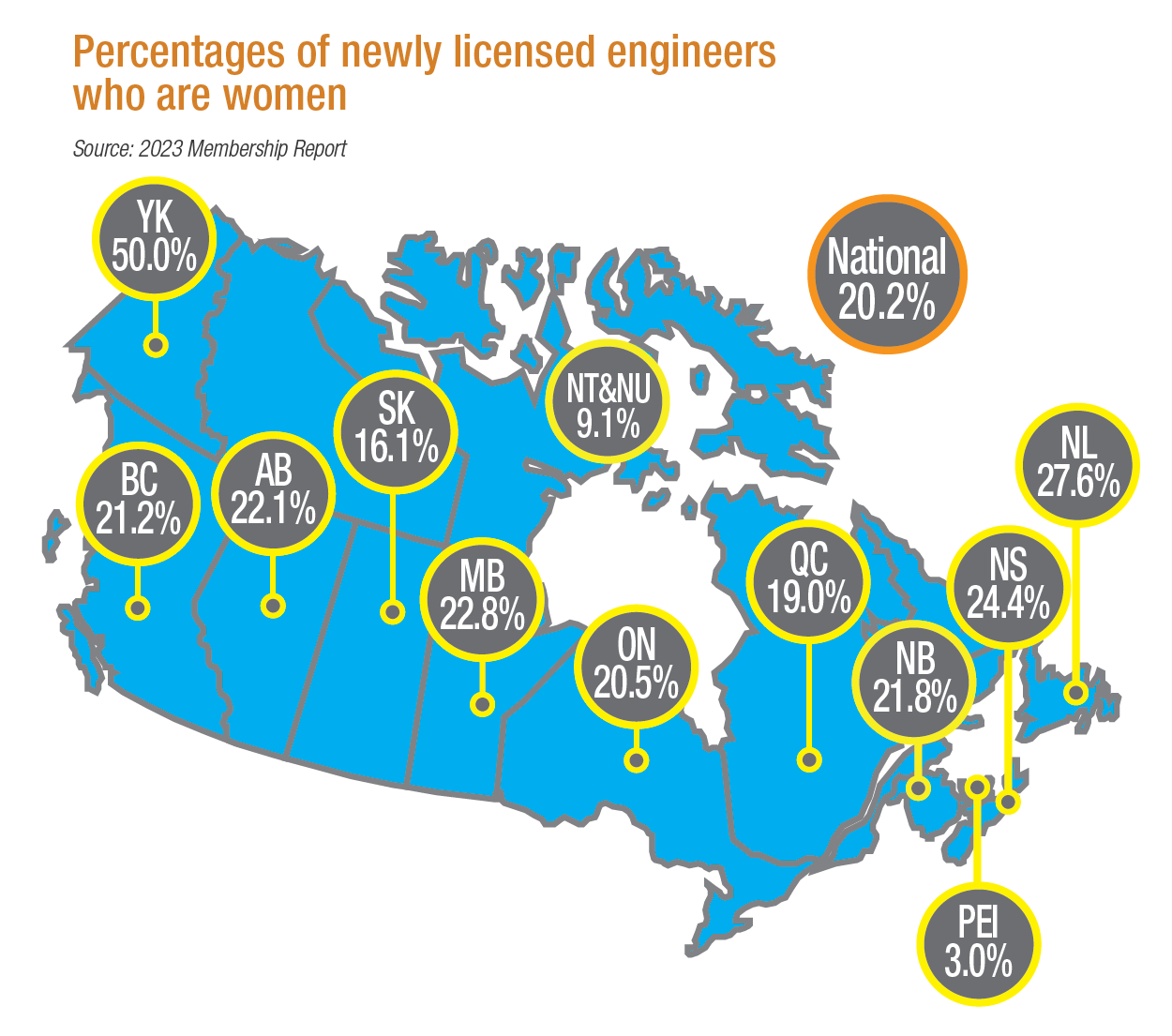
Engineers Canada has long fostered collaboration with engineering regulators and other engineering stakeholders to work collectively and share authority, decision-making, and accountability to reach 30 by 30. Engineers Canada facilitates the work of the 30 by 30 Champions network, facilitates data collection and distribution on the composition of the profession, and advocates to the federal government on issues relevant to women in engineering.
Engineers Canada is working to increase the representation of women within engineering through its 30 by 30 initiative. This initiative, first conceived by the Association of Professional Engineers and Geoscientists of Alberta (APEGA) in 2010, was adopted by Engineers Canada as the national goal of raising the percentage of newly licensed engineers who are women to 30 per cent by the year 2030. Thirty per cent is universally held as the tipping point for sustainable change—reaching 30 by 30 will help drive the shift in the overall membership of the engineering profession as more and more women continue to enter the profession.
30 by 30 has received national support across all provinces and territories. Engineers Canada collaborates with engineering regulators and other stakeholders to facilitate a national vision on this issue.

30 by 30 Champions
When an organization endorses the 30 by 30 goal, they nominate a Champion who actively engages in the 30 by 30 network. They also commit to investing in the creation and maintenance of programs and partnerships that lead to an improved experience for women in engineering; to sharing and applying best practices; to collecting metrics on the number of women in engineering in their jurisdiction; and to implementing policies that support the increased participation and retention of engineers who are women.
Province/Territory – Organization - Champion
National
- Engineers Canada’s Board of Directors - Tim Joseph and Anjum Mullick
- CEO Group Champion - Lia Daborn
- Engineers of Tomorrow - Erica Lee Garcia
- Association of Consulting Engineering Companies- Canada - Sabrina Martineau
- Canadian Academy of Engineers - TBA
- Canadian Federation of Engineering Students - Hisham Khan
Yukon
- Engineers Yukon - Amy Mclintock
Northwest Territories and Nunavut
- Northwest Territories and Nunavut Association of Professional Engineers and Geoscientists (NAPEG) - Elaine Gillespie
British Columbia
- Engineers and Geoscientists British Columbia - Shirley Chow
- University of British Columbia - Agnes d’Entremont
- University of British Columbia - Okanagan - Yang Cao
- University of Victoria - Daniela Constantinescu - Michael Zastre
- British Columbia Institute of Technology - Phyllis Chong
- Simon Fraser University - Dr. Parvaneh Saeedi
- Thompson Rivers University – Catherine Tatarnuik
Alberta
- Association of Professional Engineers and Geoscientists of Alberta (APEGA) - Mohamed El Daly
- University of Alberta - Ania Ulrich
- University of Calgary - Svetlana Yanushkevich
Saskatchewan
- University of Regina - Denise Stilling
- Association of Professional Engineers and Geoscientists of Saskatchewan (APEGS) - Rahim Ahmad and Gina McGinn
- University of Saskatchewan - Catherine Niu and Jeanie Wills
Manitoba
- Engineers Geoscientists Manitoba - Lisa Stepnuk
- University of Manitoba - Kathryn Atamanchuk
Ontario
- Professional Engineers Ontario - Helen Wojcinski
- Ontario Society of Professional Engineers - Sandro Perruzza - Angela Wojtyla
- Ontario Network of Women in Engineering – Kim Jones
- University of Windsor - Jacqueline Stagner
- Western University - Lauren Briens, Joanne Moniz
- Lakehead University - Heather Moynihan
- McMaster University - Kim Jones
- Conestoga College - Karen Cain
- University of Waterloo - Mary Wells
- University of Guelph – Jana Levison
- Toronto Metropolitan University – Nika Zolfaghari
- University of Toronto Faculty of Applied Science & Engineering – Marisa Sterling
- York University - John Adam Gales
- Queen's University- Marianna Kontopoulou
- Carleton University - Cynthia Cruickshank
- University of Ottawa - Michel Labrosse
Québec
- Ordre des ingénieurs du Québec (OIQ) - Sophie Larivière-Mantha
- McGill University - Nathalie Tufenkji
- Concordia University- Tanja Tajmel
- Polytechnique Montréal – Annie Ross
- Université de Sherbrooke - Eve Langelier
New Brunswick
- Engineers and Geoscientists New Brunswick - Christine Plourde
- Université de Moncton - Imène Bougelia
- University of New Brunswick - Katie Skead
Nova Scotia
- Engineers Nova Scotia - Pal Mann
- Dalhousie University - Amyl Ghanem
Prince Edward Island
- Engineers PEI - Ashley McEachern
- University of Prince Edward Island - Amy Hsiao
Newfoundland and Labrador
- Professional Engineers and Geoscientists of Newfoundland and Labrador (PEGNL) - Davyani Vasta
- Memorial University - Darlene Spracklin-Reid
